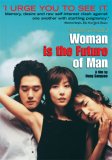| Reviews & Columns |
|
Reviews DVD TV on DVD Blu-ray 4K UHD International DVDs In Theaters Reviews by Studio Video Games Features Collector Series DVDs Easter Egg Database Interviews DVD Talk Radio Feature Articles Columns Anime Talk DVD Savant Horror DVDs The M.O.D. Squad Art House HD Talk Silent DVD
|
DVD Talk Forum |
|
|
| Resources |
|
DVD Price Search Customer Service #'s RCE Info Links |
|
Columns
|
|
|
Woman Is the Future of Man
The film begins with two old friends meeting one another for an afternoon. The casual afternoon chat will lead to a drunken weekend. Munho (Jitae Yoo) is a married art professor. Hunjoon (Teawoo Kim) is a recent film school graduate who has just returned from his studies in the US. Hong's films are about the slow reveal, little occurrences that blossom, and Woman... starts with Munho making a, uncomfortable point to not invite Hunjoon into his new, high mortgage home. Instead the two walk into the backyard and Munho offers Hunjoon "the gift" of walking on the fresh untrodden snow. Hunjoon takes a few steps and backtracks in them purposefully so it will look like one path that suddenly stops.
Doesn't seem like much, but these two innocuous moments show two sides of how Hong operates. As for not letting his friend inside his house, later a small outburst by Munho reveals that when he and his wife went to visit Munho in America, Munho embraced Hunjoon's wife "like a Yankee" and he has harbored anger over this event to the point of now wanting to keep Munho far away from his wife. This little tidbit shows a large picture of the character, Munho is a man of simmering resentment and male insecurity. As for the snow walk, it is a potent piece of symbolism, an aborted path = no future, Hunjoon walking backward in his own steps = an attempt to return to the past.
That becomes the crux of the film. As the two man children drink and reminisce about a shared love from their college days, Sunwha (Hyeona Seong), they clumsily decide to visit her and in turn dredge up their past failings. For Munho, he remembers Sunwha as a fragile girl that he wrongly mistreated, foolishly trying to "cleanse" her after she is raped by a psycho schoolchum and then unceremoniously dumping her before leaving for America. For Hunjoon, who dated her while Munho was away, he remembers her as an awkward, shame filled sexual conquest. The ultimate tale reveals two men unable to see their own shortcomings when it comes to the opposite sex. Aside from drunken pleas for punishment for their callous behavior, they are totally clueless and doomed to repeat their past wrongs.
Hong is a strict minimalist. There are about as many cuts and camera angles in the entire film as there are in the first ten minutes of a Michael Bay movie. I'm not saying that to be cute. I'm totally serious. The method of minimalism pretty much amounts to an anti-Eisenstein movement, born out of taking away cinematic manipulations like montage and close-ups. Most scenes in Woman is the Future of Man are done in one take, wide master shots, and camera movement, when it rarely occurs, is kept to simple pans. In terms of perspective, it gives you a sense of the observational. For the actors, it really gives them a wide berth for the performance, filling a whole scene, and like a play, the rhythmic gaps and silences become just as revelatory as the dialogue. For some viewers it may seem like a slog, but it is a style I have always enjoyed.
The DVD: New Yorker
Picture: Anamorphic Widescreen. Not the most striking image. While the compositions are kept pretty simple, this transfer comes across as lacking in vibrancy. It's a bit of a muddle with intermittent softness and slightly dull colors. Technically there are some combing and slight shimmering issues.
Sound: Korean Dolby Digital 5.1 and 2.0 with optional English subtitles. While the 2.0 track is obviously lacking in separation mixing dynamics, I found it to be the more pleasing track because the 5.1 just seemed flatter somehow. Its probably due to the straightforward sound mix, a lack of ambience and basic soundtrack scoring, so the lesser track was just fine. Sub translation is good, but unfortunately the white subtitles become a issue in certain scenes where they fade a bit in the bright background.
Extras: Liner notes by Michael Atkinson and Kyung Hyun Kim. --- French and Korean Theatrical Trailers. --- Introduction by Martin Scorsese (2:30). --- Interviews with the three leads (31:54). --- Making of Featurette (38:15).
Of the extras, the Scorsese intro is a nice perk. The celebrated cineaste summing up quite nicely why he enjoys the current age of Korean cinema and, in particular, Hong's work. The standout extra is the featurette which is in no way a dry, lip service promo. Instead you get a behind the scenes look at Hong working with the actors, carefully going over scenes, an excellent, candid unveiling of his directing method.
Conclusion: Foreign film fans of Hong, Antonioni, Tsai Ming-liang, or Huo Hsiao-hsien will find a very rewarding drama. The DVD is not entirely technically sound but more than acceptable, and the extra features really make the disc worth a purchase.
|
| Popular Reviews |
| Sponsored Links |
|
|
| Sponsored Links |
|
|
| Release List | Reviews | Shop | Newsletter | Forum | DVD Giveaways | Blu-Ray | Advertise |
|
Copyright 2024 DVDTalk.com All Rights Reserved. Legal Info, Privacy Policy, Terms of Use,
Manage Preferences,
Your Privacy Choices | |||||||












